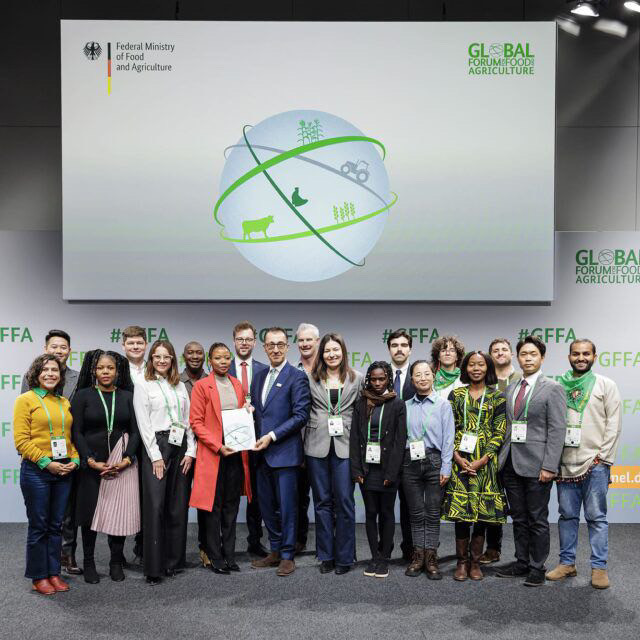From 15 to 18 January, Berlin became the central stage of global discussion on the future of food systems as the Global Forum for Food and Agriculture (GFFA) 2025 unfolded alongside the International Green Week. Being one of the biggest international gathering of agricultural ministers, and bringing together experts from politics, businesses, science and civil society, the four-day event provided a platform to address key issues in agriculture and food policy through both high-level, non-public sessions and dynamic public formats.
Find out more about the agenda
Thanks to our Ambassador and former Executive Director Bernward Geier, IFOAM – Organics International had the chance to bring a strong delegation of members and representatives from across the globe. Together, we made the case for organic agriculture and agroecology as viable options to respond to global challenges as well as being the true approach to bio-economy, which was the main theme of the event this year.
15 January | International Young Farmers’ Forum (IYFF)
At this exclusive gathering, 20 young farmers from all around the world shared insights from their farms and their work in national farmers’ organisations. Julia Lernoud, our World Board Member from Argentina, represented the organic movement, contributing to the jointly developed declaration, “Farming a Sustainable Bioeconomy”, which was later presented to Germany’s Minister of Food and Agriculture at the Agriculture Ministers’ Conference.
During discussions on the declaration’s text, Julia faced strong opposition when advocating against techno-fixes like GMOs as a solution to global food security. A significant contingent of young farmers appeared supportive of input-intensive agriculture and the ready-made solutions promoted by multinational agribusinesses. This debate underscored the critical need for education at all levels on knowledge-intensive, sustainable food systems—such as organic agriculture—to foster critical thinking and alternatives to the conventional practices that have contributed to today’s food system challenges.
16 - 17 January | Innovation Forum
The 2-day GFFA Innovation Forum was an exhibition format where NGOs, companies, authorities and associations were given a chance to present practical examples and new solutions around the main GFFA topic. Among the small group of exhibitors (26) invited this year, IFOAM – Organics International highlighted four initiatives:
The shift driven by the Minicipality of Kauswagan to organic agriculture with the “From Arms to Farms” programme, which transforms former conflict zones into thriving farming communities.
The initiative, a fresh winner of the 2024 Future Policy Award on Peace & Future Generations, is striving to reintegrate former combatants through sustainable agriculture, dramatically reducing poverty and fostering peace between Christian and Muslim communities in the Philippines. Through this initiative, the organic movement had the privilege to be represented by Rommel Arnado, Mayor of Kauswagan at the GFFA High Level Panel, who has demonstrated how training in organic farming, financial literacy and conflict resolution can tackle the root causes of poverty and division.
The Himalayan Agroecology Initiative (HAI), which is aiming at developing and implementing country-level roadmaps in this highly vulnerable region of the world, with the goal to establish food systems that are resilient to climate change and beneficial to smallholders’ livelihoods. The strategic framework of Nepal’s Agroecology Roadmap, presented by Bharat Bhandari, Executive Director of our partner organisation LI-BIRD, generated a lot of interest among country officials visiting the event, as many nations are looking for ways these days to get out of the trap of input-intensive agriculture with skyrocketing prices of synthetic fertilisers.
Our member organisation, the Institute of Development and Environment (IDMA), a partner of the Ecological Agriculture Network RAE in Peru. They are using a PGS+ system valuing the agroforestry systems that family producers develop in their farms, quantifying the environmental services generated by the carbon capture of family and community forests. Revaluing the importance of forest species through the development of associated management practices between trees and crops or trees and pastures, allows producers to have not only crop production, but also to conserve forest species. IFOAM – Organics International is working with IDMA, represented there by Maikol Muñoz Oliveros and Valeria Cordova, as part of the Business Incubator and Accelerator for Mountains and Islands to support producers in differentiating their mountain products and finding appropriate markets, with backstopping, capacity building, and knowledge exchange activities focusing on PGS.
The first results of a programme empowering smallholder groups in India and Tanzania through PGS and internal control systems was presented by the head of delegation to GFFA Gábor Figeczky at the Organic Cluster session of the Federal Ministry of Food and Agriculture (BMEL).
Networking for advocacy and strategy development
At the exhibition, our delegates as well asnd the Swiss Organic Research Institute of Organic Agriculture (FiBL) hads the opportunity for an exchange with Claudia Müller, Parliamentary State Secretary of BMEL, to show evidence through scientific and practical examples on how organic brings innovative solutions to economies in all parts of the world.
The event also served as a platform for us to meet policy makers from a number of countries. This was the case with Dr. Gagnesh Sharma, Director of the National Centre for Organic and Natural Farming in India, with whom we had a brief meeting strategising on how we can create ownership of policy makers over the HAI Roadmap in India. Dr. Sharma is a member of the Agroecology Himalayas Task Force, regularly consulted on the development of the roadmaps.
The GFFA came to a close with the Berliner Agriculture Ministers’ Conference, where 63 Ministers from all around the world and 14 high-level representatives of International Organisations gathered to discuss how bioeconomy can be a way forward to tackle global crises including climate change and biodiversity loss. IFOAM – Organics International will follow the development of the narrative around bioeconomy, to make sure it is guided by the principles of organic agriculture and agroecology.





